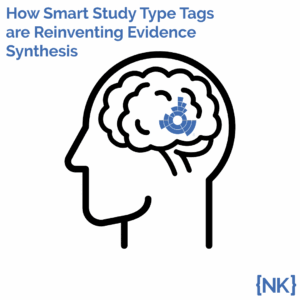
How Smart Study Type Tags Are Reinventing Evidence Synthesis
One of the features of Core Smart Tags is Smart Study Type – this refers to our AI system that automatically categorises the study type
Any medical researcher can tell you that systematic reviews are hard. It’s not just the difficulty of building out a research question/protocol/search strategy that is intimidating—there is also simply a large burden in screening and extraction to ensure the true comprehensiveness of the studies and data collected.
However, not all questions are appropriate for systematic review, and different methods are needed when your research is not a question about the entire body of literature for a given topic, but something narrower. Also, the timeliness of the output matters—getting high-level answers quickly can often make a major difference where the systematic review would simply be too slow). So, we wanted to talk about the less well-known but related review method that has been growing in health economics and outcomes research: the targeted literature review.
Nested Knowledge is built to be “living systematic review software” so that comprehensive, up-to-date evidence is always available, but we knew that flexibility to the goals of different researchers was paramount. So, the software does not force you into comprehensiveness; instead, it gives you the tools to scope the breadth and predict the time commitment of whatever review task you are undertaking.
While a systematic review will usually require a specific and pre-defined search strategy and protocol, a targeted literature review can answer high-priority questions with a rapid and evolving search, where the most-relevant publications are themselves examined for a narrower range of evidence.
If you’re just looking for the most relevant and useful information in a timely manner, targeted literature reviews in Nested Knowledge may be your best option. You do not have to completely finish screening the nest to extract valuable data from it. While the search tool in a nest has the ability to be all-encompassing, a user can also quickly narrow the scope of the search to better focus on a specific topic. Both ways work in NK.
Typically, only one database needs to be searched in a targeted literature review while protocols often call for cross-referencing multiple databases in a systematic literature review. The extra work is meant to limit the amount of bias that would appear in the final output, but it also increases the time and effort required to complete the work. A targeted review can be done in half the time or even faster than that of a systematic review.
You do not need to have an exact question to answer when searching in a nest. The goal of a systematic review is usually to have a very structured, cross-population, cross-intervention question, while in a targeted literature review the query can be scoped more flexibly on a narrower topic. The inherent flexibility of targeted methods means that extraction can be highly specific, qualitative-only, or even include non-combinable data, depending on what is needed. Any question that does not demand that the answer be determined from all possible sources, may be a question for a targeted literature review.
It’s like going to a fancy restaurant and instead of ordering appetizers, an entree, and dessert all at once, you take them one at a time to find out if you really need the next one. If you’re too full for dessert then you don’t order it. Why get more than you need? But if you didn’t get the food before you wouldn’t have known that you did not need dessert. The complete systematic review is the whole several-course meal while the targeted review is just the entree and the appetizer that you really need. But the entree and appetizers are still useful because without ordering them you would not know you were full and did not need to order dessert. It’s all part of the same system but you only get what you need.
Here is a little chart to break down the difference:
| Task: | Systematic Lit. Reviews | Targeted Lit. Reviews |
| Search: | Comprehensive | Focused |
| Screening: | Review all records | Relevant-first |
| Extraction: | Potentially relevant outcomes | Most-relevant outcomes |
Within the Nested Knowledge tool titled “Search Exploration”, users will find that breaking down a targeted review question into that is much simpler and presents a clearer picture when trying to analyze results.
If you check out the NK wiki on Search Exploration, you can learn quickly how to use AI to drill down on topics for your potential targeted literature review. Since Search Exploration provides (1) a summary of the results of a search and (2) a customizable search builder with transparent results, you can narrow your search to hundreds or even dozens of studies, and you’ll be able to predict relevancy based on the common topics reported by the RoboPICO and Topic Modeling AIs.
So when building your nest, or even pondering a question. Know that it does not need to be a complete, well-drawn-out, full systematic review. It can be a broader, faster, and simpler research topic that provides valuable information all the same. Whether you need the collective systematic review or are only interested in drumming up some records, Nested Knowledge can get it done.
Need help with your nest? Or have any questions? Feel free to reach out to contact@nested-knowledge.com
Yep, you read that right. We started making software for conducting systematic reviews because we like doing systematic reviews. And we bet you do too.
If you do, check out this featured post and come back often! We post all the time about best practices, new software features, and upcoming collaborations (that you can join!).
Better yet, subscribe to our blog, and get each new post straight to your inbox.

One of the features of Core Smart Tags is Smart Study Type – this refers to our AI system that automatically categorises the study type